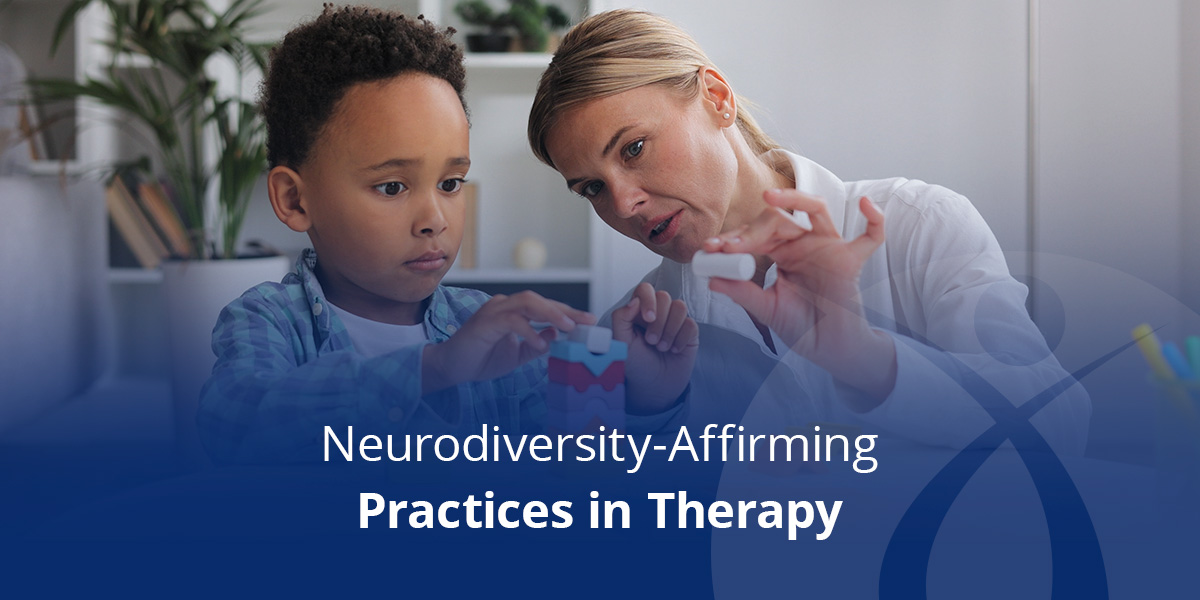
Neurodiversity-affirming practices in therapy embrace neurodiversity, which concerns how brains function. It’s about understanding that conditions like autism spectrum disorder, attention-deficit hyperactivity disorder (ADHD) or dyslexia are natural differences. Neurodiversity-affirming practices respect these differences and want to help people live their best lives based on their strengths and choices.
Neurodiversity-affirming practices value and respect the differences in how our brains work. Neurodiversity-affirming therapy embraces these differences as natural variations. The goal is to help people with these differences live authentic lives by embracing their strengths and fostering autonomy.
What It Means to Be Neurodivergent
Being neurodivergent means that your brain operates differently from what is deemed typical. For instance, some people might have autism or ADHD, meaning their brains process information and emotions differently from the norm. The term “neurodivergent” acknowledges these differences instead of suggesting they should change.
Some people with mental health conditions may not identify with the neurodivergent label, but it is becoming a popular umbrella term that acknowledges the diversity of human brain functions.
Some examples of conditions or characteristics that fall under the neurodivergent umbrella include:
- Autism Spectrum Disorder: Autism is a developmental disability with genetic links. Individuals with autism learn differently and experience the world in a unique way due in part to differences in communication, behavior and emotional regulation and sensory processing abilities. These differences can contribute to strengths in multiple areas, such as gaining in-depth knowledge, maintaining routine and structure, and offering important sensory insights about an experience.
- Attention-Deficit Hyperactivity Disorder: ADHD brings challenges with executive functioning, including difficulty focusing and inhibiting impulses. People with ADHD might struggle to stay focused for a long time. They often have many creative and innovative thoughts. Their unique cognitive processing can lead to unconventional solutions and fresh perspectives.
- Dyslexia: Dyslexia typically calls for specialized instruction in reading and spelling, but having dyslexia may mean individuals are more likely to adapt towards strengths in perceptual problem solving.
- Sensory processing differences: Some individuals who are neurodivergent have sensory processing differences in how they experience sensory stimuli — like touch, sound, light, or movement. They might be more sensitive to certain sensations or seek out intense sensory experiences for comfort and regulation.
- Intellectual disabilities: People with intellectual disabilities have variations in cognitive functioning. These differences mean learning at a different pace than their peers. Individuals with intellectual disabilities benefit from strengths-based approaches to learning and participation in daily life activities. Provided with appropriate supports, their talents and unique skills shine through and allow meaningful, authentic engagement in daily life.
- Giftedness: Some individuals have cognitive abilities that transcend the norm. Their exceptional talents span intellectual, creative, artistic or leadership domains. These abilities may come with challenges related to asynchronous development and intense sensitivities, making daily life more challenging.
- Anxiety and mood disorders: Someone with anxiety or a mood disorder might have chemical imbalances in the brain and other processing differences that impact how they interpret events and emotions.
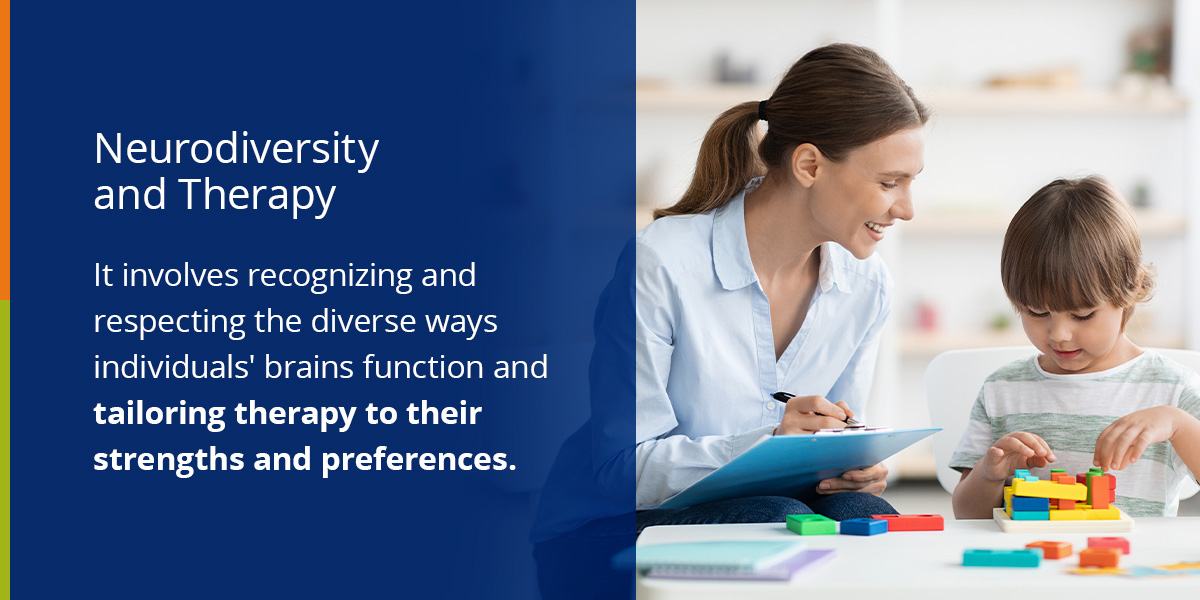
Neurodiversity and Occupational Therapy, Physical Therapy and Speech-Language Pathology
Therapy aligns with neurodiversity-affirming principles in important ways. It involves recognizing and respecting the diverse ways individuals’ brains function and tailoring therapy to their strengths and preferences. This approach emphasizes empowerment, inclusion and promoting meaningful participation in daily activities for neurodivergent individuals.
Neurodiversity-affirming therapy is centered around embracing the natural diversity in neurological functioning, nurturing strengths and catering to individual preferences. This approach in neurodiversity-affirming therapy aims for inclusivity and empowerment, fostering a supportive environment for diverse neurological experiences.
Respect for Neurodiversity
Therapy practitioners are neurodiversity-affirming when they treat their clients with respect for their neurodivergent identities. They recognize that every person’s experiences and strengths are one-of-a-kind.
Strengths-Based Approach
Instead of focusing on weaknesses, neurodiversity-affirming practices emphasize finding and nurturing a person’s strengths. This helps clients improve their skills for daily tasks, reach their goals, and protect their mental health.
Empowerment and Autonomy
When therapy practitioners embrace neurodiversity-affirming practices with clients, they create authentic goals that truly match what the client wants. Therapy interventions help people have more control over their lives and make choices that align with their values and priorities.
Cultural Competence
Neurodiversity-affirming therapy practitioners understand the importance of respecting diverse cultures and experiences. They also recognize the connections between neurodiversity, race, gender and financial status.
Environmental Considerations
Neurodiversity-affirming practices take into account the physical and social environments where people live, work, and play. Therapy practitioners can adapt and modify the environment to better meet individuals’ sensory, communication, physical and emotional regulation needs.
Collaboration
Neurodiversity-affirming therapy involves teamwork, including working with families, caregivers, teachers and other experts. This helps create a strong and supportive network for the individual.
Education and Advocacy
Neurodiversity-affirming therapy practitioners teach clients, families and communities about neurodiversity to foster greater acceptance and appreciation for individual differences. Advocacy includes promoting inclusive practices in schools, workplaces and other settings.
How Can Therapists Be Neurodivergence Affirming?
Integrating neurodiversity-affirming principles as a therapist means valuing how people’s brains differ, appreciating their strengths and helping them have fulfilling lives. Embracing neurodiversity-affirming practices involves recognizing and valuing the unique strengths and perspectives of individuals with neurodivergence.
Neurodiversity-affirming therapy promotes inclusivity and empowerment by tailoring support to individual needs and fostering a deeper understanding of diverse neurological experiences. Here’s what you can do to promote neurodivergent-affirming therapy:
- Cultivate a respectful attitude: Treat every client respectfully about their neurodivergent identity. Avoid pathologizing language and instead use strengths-based language that focuses on individual capabilities.
- Establish individualized goals following strengths-based assessment: Focus on strengths and interests when assessing. Set goals together that match their values and priorities, building on their strengths and preferences.
- Recognize sensory preferences: Create a sensory-friendly environment considering sensory sensitivities and needs. Offer ways to manage too much sensory input or to get more of desired input.
- Accommodate communication needs: Accept and respect all modes of communication. Embrace, model and support augmentative and alternative communication (AAC) in all types of daily activities.
- Provide choice and autonomy: Offer clients choices in therapeutic activities, approaches and interventions. Empower clients to take part in decision-making and planning their therapy journey.
- Use special interests: Incorporate special interests to add meaning and support engagement in therapy. Recognize that special interests can provide opportunities for in-depth learning, skill development, and meaningful connection.
- Support life skills in day-to-day activities: Adapt and modify activities and the individual’s surroundings to boost independence and autonomy with self-care, leisure, work, and social participation.
- Advocate for inclusion: Work with teachers, bosses and community groups to make spaces and events inclusive for neurodivergent individuals. Advocate for reasonable accommodations to ensure access to education, employment and community resources.
- Educate and empower: Teach clients, families and caregivers about neurodiversity to build awareness and acceptance. Provide resources that empower clients to advocate for themselves and their needs.
- Reflect and adapt: Reflect on your practice and seek client feedback to improve your approach. Stay informed about evolving research and best practices in neurodiversity-affirming care.
- Foster cultural competence and intersectionality: Know that neurodivergent individuals have diverse cultures and backgrounds. Tailor your approach to respect their unique intersectional experiences.
- Engage in continuous learning: Stay updated on new research, therapy techniques and technology in neurodiversity. Improve your skills through training to better support neurodivergent individuals.
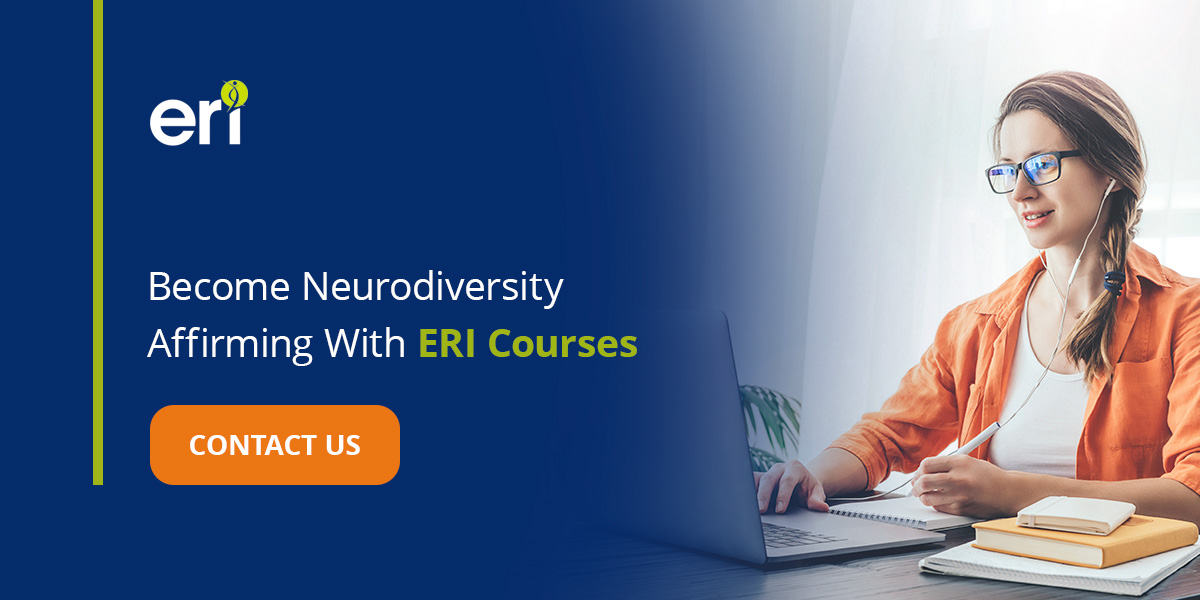
Become Neurodiversity Affirming With ERI Courses
Embracing neurodiversity is key to creating a more inclusive and compassionate society. To learn how to make a difference, consider enrolling in Education Resources Inc. courses, which provide valuable insights and strategies for becoming more neurodiversity-affirming.
When you understand and value each person’s unique experiences, you can provide helpful support and empower them. Join us at ERI to further your knowledge and skills and contribute to a world that values and uplifts the diverse strengths of all individuals. Contact us for more information on our continuing education courses today.

 As we finalize the finishing touches for this year’s exciting conference, we want to take a moment to announce this year’s award winners of the annual ERI Scholarship and Award for New to School-Based Practice.
As we finalize the finishing touches for this year’s exciting conference, we want to take a moment to announce this year’s award winners of the annual ERI Scholarship and Award for New to School-Based Practice. Congratulations are in order for Brielle Mayes! This award is meant to celebrate and support an emerging leader who is new to the field of school-based therapy. It is never easy to begin practicing in a new area and we really admire those who persevere and provide quality care despite the challenges they might encounter during those first few years.
Congratulations are in order for Brielle Mayes! This award is meant to celebrate and support an emerging leader who is new to the field of school-based therapy. It is never easy to begin practicing in a new area and we really admire those who persevere and provide quality care despite the challenges they might encounter during those first few years.  We’re thrilled to recognize Shelly Weakly! Our awardee was nominated by a colleague, who values her mentorship and support and who wanted to celebrate this therapist’s exemplary demonstration of collaboration, leadership and ingenuity. For over 25 years, this therapist has served an Illinois school district consisting of 25 schools and aside from participating in her normal therapy responsibilities, she has also carved out time to create a unique piece of therapy equipment for her students.
We’re thrilled to recognize Shelly Weakly! Our awardee was nominated by a colleague, who values her mentorship and support and who wanted to celebrate this therapist’s exemplary demonstration of collaboration, leadership and ingenuity. For over 25 years, this therapist has served an Illinois school district consisting of 25 schools and aside from participating in her normal therapy responsibilities, she has also carved out time to create a unique piece of therapy equipment for her students.
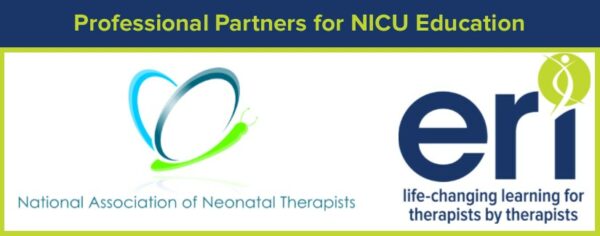

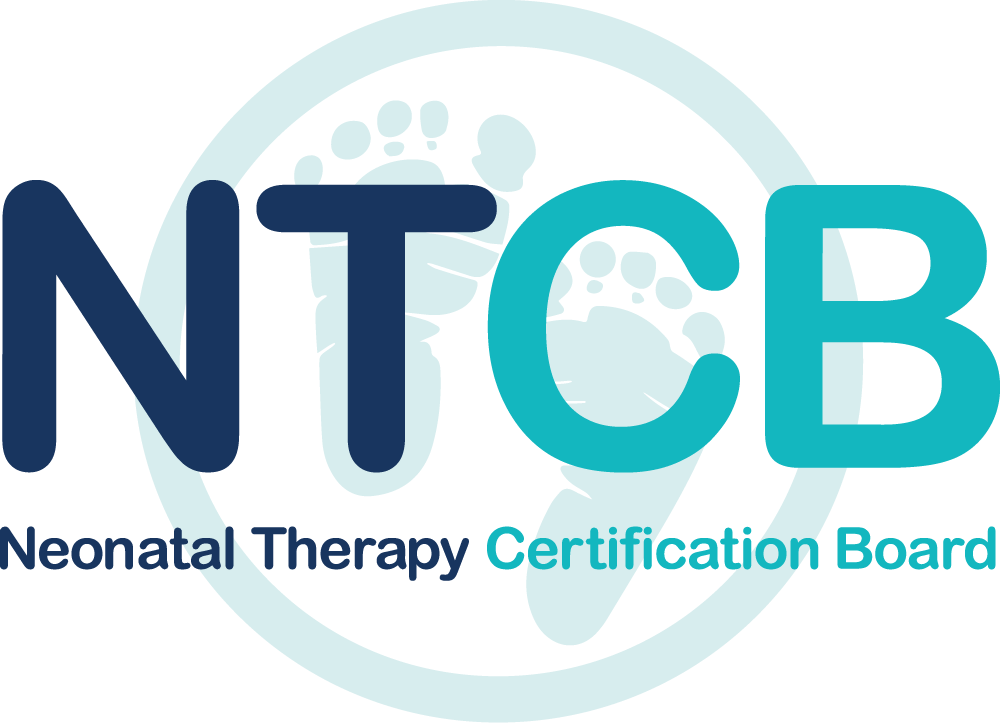 The deadline for recertification for Certified Neonatal Therapists is fast approaching. If your certification expiration is in the months of July through December, your recertification applications are due September 30th.
The deadline for recertification for Certified Neonatal Therapists is fast approaching. If your certification expiration is in the months of July through December, your recertification applications are due September 30th.

 Maybe you took Sue’s popular session
Maybe you took Sue’s popular session